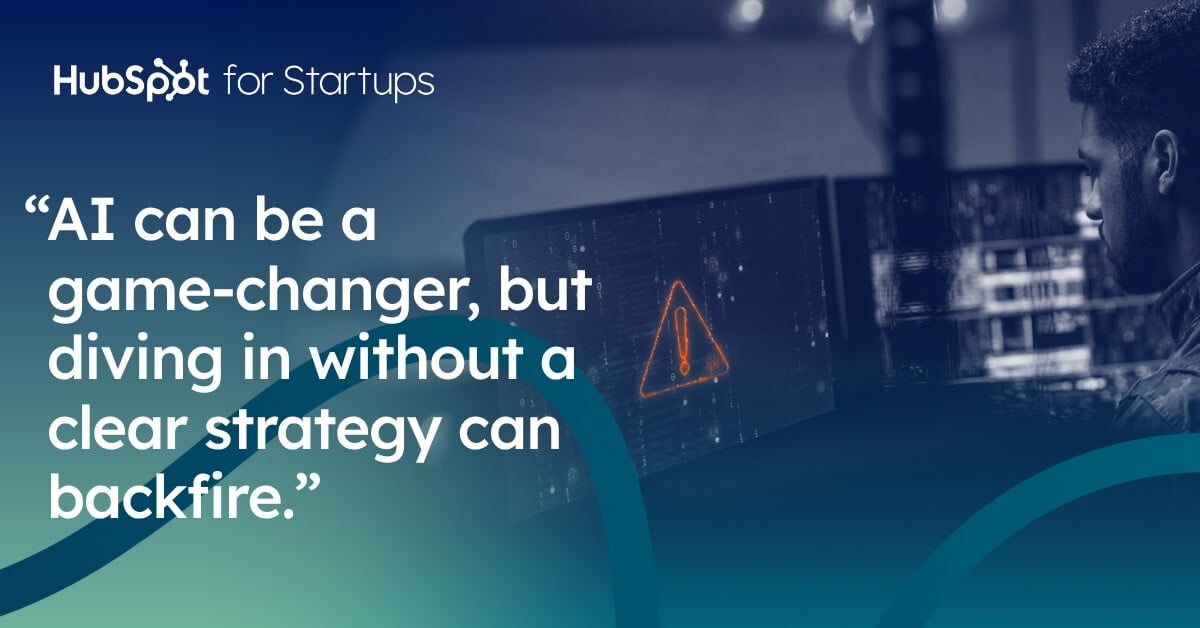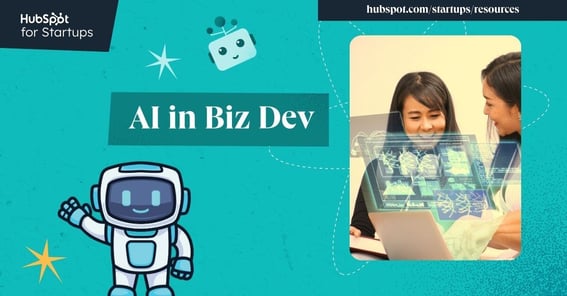AI Risks for Businesses: What Startups Need to Know
Watch out for these risks of artificial intelligence in business so you can navigate AI safely and strategically to benefit your startup’s growth.
Written by: Phoebe Gill

Watch out for these risks of artificial intelligence in business so you can navigate AI safely and strategically to benefit your startup’s growth.
Written by: Phoebe Gill

Artificial intelligence (AI) offers startups nearly limitless opportunities to innovate, streamline operations, and scale rapidly.
From automating routine tasks to providing key insights, AI is a game-changer for startups. However, there are also risks that, if not properly managed, can spell disaster for a fledgling business.
If startups approach AI adoption thoughtfully, they can unlock and harness its full potential while still safeguarding their business and customers.
This Hubspot for Startups guide helps founders navigate AI implementation risks. We'll explore and explain common challenges, provide real-world examples, and offer practical strategies to mitigate said risks.
Startups, by nature, are eager to embrace change. With minimal bureaucracy and flexible processes, this type of business pairs perfectly with AI, like peanut butter and jelly, the perfect combination for innovation.
Yet, the same qualities that enable startups to adopt AI solutions quickly can also expose them to significant risks.
With limited financial resources and small teams, startups often lack the capacity to evaluate and test AI tools thoroughly. This makes them vulnerable to adopting insecure solutions, potentially leading to data breaches or other critical vulnerabilities.
Any missteps caused by poorly implemented AI systems can result in serious financial losses or even irreversible reputational damage.
Furthermore, the rapidly evolving regulatory landscape surrounding data governance and ethical AI adds another layer of complexity. Most startups haven’t yet caught up with these developments, increasing the risk of non-compliance. Regulatory missteps can lead to legal penalties, which can be costly and difficult to recover from.
Here are eight of the most common AI risks to pay attention to:
AI programs are famously prone to generating confident but incorrect information known as "hallucinations." Even high-profile attorneys have been caught in court relying on false information from ChatGPT during their legal research. This is a clear reminder of the very real risks startups must take seriously when integrating AI into their operations.
For an example of how startups are at risk of “hallucinating” AI-tool issues, let’s look at Anysphere's AI-powered coding assistant, Cursor.
In April 2025, a user reported being logged out when switching devices and reached out to support.
Their AI chatbot, "Sam," responded by stating that Cursor's policy restricted use to a single device per subscription, but this policy did not exist.
The chatbot had hallucinated it.
This AI-invented policy led to a public backlash on platforms like Reddit and a serious uptick in cancelled subscriptions.
Startups should always implement a human-in-the-loop approach when it comes to customer interaction, ensuring that AI-generated responses, especially those affecting customer experience, are reviewed by human agents.
When it comes to AI, leadership should never lose sight of protecting a company’s reputation and looking after customers.
As AI continues to evolve, we will need to develop balanced relationships between humans and AI to have them work together for the best and safest results.
At startups, it's natural to want to dive into the latest AI tools to stay competitive and drive rapid growth. But left unchecked, that enthusiasm can lead to serious issues, such as security breaches and unreliable results.
Before rolling out a new AI tool across your company, it's essential to conduct thorough vendor due diligence. Due diligence includes reviewing certifications, understanding how data is handled, and ensuring the tool complies with relevant data protection standards.
Take the time to read all available documentation before integrating any AI solution into your operations. For example, Hubspot’s AI Trust Center is regularly updated, providing accurate information on all our security measures and ethical guidelines when it comes to our suite of AI tools.
Prioritize working with AI startups and tools that are transparent about their practices. If there’s any uncertainty, don’t hesitate to involve your (human) legal counsel in the process.
Sandbox testing is also a smart move, allowing you to assess how the tool performs in a controlled environment without risking your whole company.
For instance, HubSpot offers a robust sandbox feature that mirrors your production setup, enabling safe experimentation with workflows and integrations.
AI bias isn't just a technical hiccup; it’s a serious risk that can lead to legal, ethical, and reputational issues.
Startups often move so quickly that they overlook the critical importance of scrutinizing training data, which can lead to the unintentional embedding of harmful societal biases into AI tools.
When left unchecked, these biases can produce discriminatory outcomes, damaging user trust, attracting regulatory scrutiny, and most importantly, causing real harm to individuals and their lives.
To mitigate these AI risks, it's essential to maintain a clear understanding of the data on which your AI models are trained. Implementing explainable AI (XAI) techniques is a key part of this process. XAI helps demystify how AI systems make decisions, making it easier to identify, understand, and correct potential biases before they cause harm.
Lack of legal and strategic planning can spell disaster in the age of AI. Without early legal involvement, startups may inadvertently violate regulations, face lawsuits, or lose intellectual property rights.
You’ll need to get a legal team involved and be sure to implement AI governance standards, which will provide structured guidance for responsible AI deployment.
Engaging legal counsel from the outset will ensure that any new AI initiatives comply with evolving laws and ethical standards, safeguarding your company's future.
AI can be a game-changer, but diving in without a clear strategy can backfire.
Over-automating without aligning AI tools to the customer journey can result in a disjointed user experience and unhappy customers. Likewise, failing to plan how AI will integrate with existing internal processes can leave team members confused or frustrated.
That’s why it’s essential to do your homework before introducing any new AI tools.
Make sure they complement your team’s workflow and enhance the customer experience. When implemented thoughtfully, AI can be truly transformative.
Take Transkribus, for example. It adopted HubSpot’s Breeze Customer Agent to handle routine support inquiries. According to Florian Stauder, Director of Operations at Transkribus:
“Implementing the Breeze Customer Agent has been transformative for our support operations. Today, it resolves 60% of customer inquiries, empowering our team to focus on the more complex cases. What was once a manual and time-intensive process is now streamlined and efficient.”
Transkribus’ success came from a deliberate, strategic approach, boosting efficiency without sacrificing the human touch that defines their brand.
Shadow AI is when employees secretly use AI tools without the knowledge and approval of management and IT.
It’s easy to see why team members might turn to unapproved AI tools as a way to boost their productivity and earn brownie points with leadership.
But, by doing so, they might accidentally share sensitive data and bypass security protocols. A recent report revealed that nearly 40% of IT workers admit to using unauthorized generative AI tools, highlighting the prevalence of this issue.
To combat this, startups need to promote a safe environment where AI use is encouraged, providing employees with approved, secure AI tools that meet their needs.
Establishing clear AI usage policies and conducting regular training sessions helps to foster a culture of transparency and responsibility.
Without continuous human monitoring, even minor errors can escalate into significant issues.
A notable example is Zillow's famous iBuying program, Zillow Offers. Launched in 2018, the program relied on the company's "Zestimate" algorithm to purchase and flip homes.
However, the algorithm couldn’t deal with the complexities involved in real estate valuations, and Zillow ended up losing over $300M and laying off over 2,000 employees.
All startups should heed this case study as a warning and establish clear performance metrics along with regular audits to monitor any AI solutions.
At the end of the day, a company’s most valuable asset is its reputation and brand.
Yet, just a few AI missteps can seriously damage, if not completely destroy, that hard-earned trust.
Incidents involving biased algorithms, privacy breaches, or opaque decision-making have already sparked public backlash and eroded stakeholder confidence in several organizations.
Consider the case of the tutoring startup iTutor Group, which paid $365K in a settlement to over 200 applicants after its AI-powered hiring system automatically rejected women aged 55 or older and men aged 60 or older. This case is a stark reminder of the real-world consequences of unchecked AI systems.
To prevent such outcomes, companies must establish and follow ethical AI frameworks. These frameworks include conducting regular internal audits, setting clear development and usage guidelines, involving diverse voices in decision-making, and ensuring transparency in AI operations.
These steps are critical to ensuring AI tools “behave” responsibly and safeguarding both your brand and the people it serves.
The next time you come across a new AI tool you’re excited to implement in your startup, be sure to follow these golden rules:
Integrating AI into your business will unlock exciting growth opportunities when done right.
Here's how HubSpot customers are leveraging our AI tools to scale their startups.
Camp Network streamlined its operations using Breeze Customer Agent, which now automatically handles 60% to 70% of customer inquiries. According to Andrew Downing, Director of Business Development at Camp Network:
"It was remarkably easy to set up and has freed our team to focus on sales and marketing efforts."
SnapFulfil gained three times more visibility into high-intent prospects by implementing Breeze Intelligence's buyer intent feature. The AI has empowered teams to prioritize leads and tailor outreach strategies more effectively.
Thanks to Hubspot’s AI tools, B12 now resolves 58% of its chat inquiries instantly, allowing the team to concentrate on more complex cases. Breeze has led to higher customer satisfaction scores and improved overall experience. Additionally, with 24/7 coverage, customers are able to receive timely responses, even after regular business hours and on weekends.
Explore more HubSpot AI success stories.
Adopting AI into a startup requires a balance between innovation and caution. Make sure you understand the specific AI risks and implement safeguarding measures beforehand to allow your company to harness AI's benefits while holding on to your hard-earned success.
Download our AI Usage Policy Template, which covers everything you need to build a bespoke policy and set of guidelines for your startup.

Find out how AI and tech stacks are transforming fundraising, and you can become more efficient and effective in your hunt for funding.

AI can significantly amplify business development for your startup by automating processes, providing insights, and improving decision-making.

AI is completely changing the way that startups go to market. Here’s a look at AI-powered startup GTM strategies with examples from successful brands.
